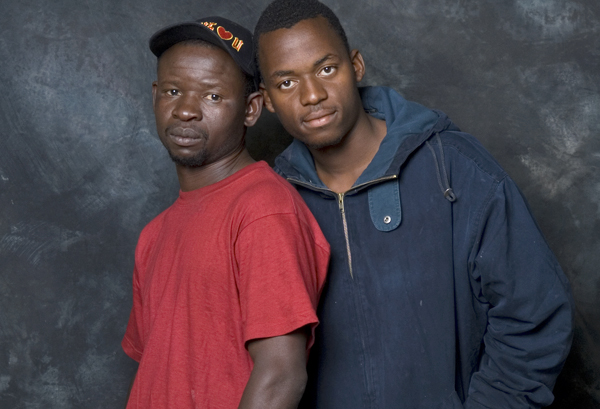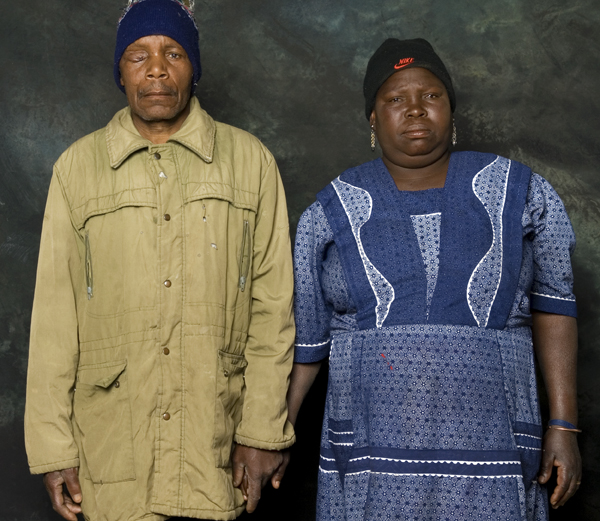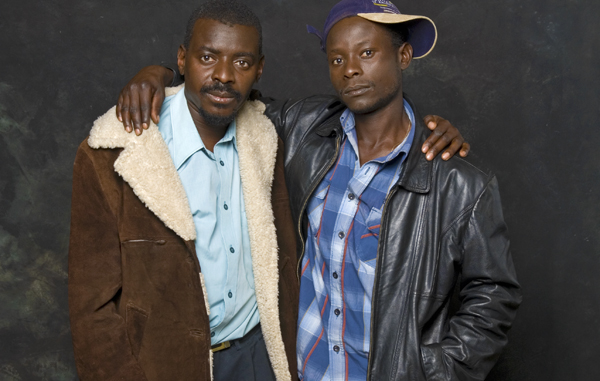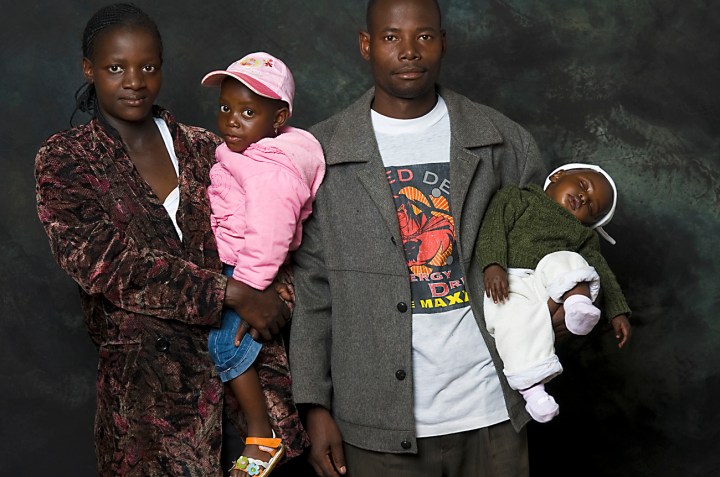As South Africa anxiously waits to see if there will be a repeat of the xenophobic violence, we look back at some of the victims of those 2008 attacks. Meet some of the faces behind the headlines, the people who lost everything – and were lucky to escape with their lives, unlike some of their compatriots. Lest we forget. By TANYA PAMPALONE.
The Shopkeeper’s Family (main photo)
Olivia, Emily, John Omar and Emily Phiri
He was one man in the crowd of a hundred that swarmed outside the tuck shop near Brakpan. A hood over his head to hide his identity, John Omar Phiri stood among the mob and watched his old customer, his neighbour of many years, tell the group that Phiri was not from here. He was a qweri qweri, a Malawian, married to a Mozambican – the daughter of that other foreign shop owner just down the road. They would get his father-in-law, too. He would be next. It did not matter that his wife’s father had been in South Africa since 1961, that Phiri had come from Malawi in 1996, that he and his wife had two children on South African soil, four-year-old Emily and five-month-old Fatima. Phiri watched helplessly, with his wife huddled at a neighbour’s home with their two children, as the crowd removed everything from his shop. They took all he had worked for since 2001, including the fridges that kept beer, cool drinks and food chilled for his customers. They took bread and vegetables and air-time vouchers, cell phone chargers and earpieces. And all their money, their belongings, everything, including their clothes. He watched it all go, saw the faces of his neighbours as they descended on his life, pulling it apart, ripping it to pieces, vultures on a live carcass. “The clothes we are wearing, these we got from the community hall,” he says, pulling on a grey wool coat. “Everything is gone.” He brought the police to the crime scene the following day. They shook their heads and left.
The Walkers

Takawira Moyo and Wisdom Maketo
It took Takawira Moyo just over a year to set up his life in South Africa. He started out doing piece jobs – painting, building fences, that sort of thing – but a few months ago he began to organise his own crews.
Things were looking so good he went to fetch his wife and younger brother in Zimbabwe and bring them to the home he’d built in Pennyville, outside Springs. But before they reached the border while on their way back to South Africa, Zimbabwean soldiers ordered everyone out of the truck they were riding in. They had the men lie down on their stomachs. Then the soldiers beat the passengers with sticks and the butts of their guns, accusing them of being opposition supporters. The soldiers took every rand they had and then sent them on their way.
When the trio reached the Beit Bridge border post there was no money for the taxi trip to Gauteng. So they walked. It took them three weeks to reach Polokwane. They walked all day and slept in the bush, under bridges, in the hills. They were scared of lions, but what choice did they have? They depended on the kindness of others they met on the road to feed them. What choice did they have?
At Polokwane, Moyo and Maketo found work. They worked for six days, loading a truck with rocks. At the end of the week, they were each paid R100. They took the money and left Moyo’s wife in Polokwane, to work for a woman in exchange for room and board, and went in search of the man who owed Takawira R1?300 for a job he’d completed before he left. Things were going to be alright.
The brothers arrived in Pennyville the night the violence broke out. They heard the noise outside, a mob screaming that foreigners must leave. They fled without shoes on their feet. There was certainly no time to collect the R1?300, or their ID documents, their training certificates, the TV, their clothes. Moyo and Maketo ran until they reached the edge of the township. There they turned and watched their home go up in flames.
The Miner and His Wife

Joseph Mondlana and Martha Mongwe
How long do you live a country before you can call it your own? Five years? Ten? Twenty? Half your life? Joseph Mondlana left his native Mozambique 47 years ago to find work in South Africa. He arrived in 1961 and got a job at Boxburg’s ERPM gold mine. Most of his life was spent there, deep in the South African earth.
In 1999 he retired. He was 59. Mondlana planned to take care of his six children and his South African-born wife, Martha Mongwe, with his pension and a bit on the side – what Mongwe brought in from selling vegetables and cool drinks from their seven-room shack in Holomisa. But Mondlana’s pension never materialised, so the family made do with their small shop.
That was until the mob came in May and dragged the old man into the street and beat him in front of his wife and his children until his right eyeball came loose from its socket, and then they smashed it, too. The mob took everything of value from the family’s home and burned what remained to the ground.
At the refugee camp, Mongwe, who walks with a leather hoof strapped to one foot because of a childhood tragedy that left her with a stump at the end of her leg where her foot should be, has to lead her husband to the portable toilets at night as he cannot find his way there alone. The doctors were unable to save his right eye and his left eye sees only shadows.
They sit on white plastic water buckets outside their tent, the wind beating the white canvas that is their home. They squint into the sun. They are waiting, still, for Mondlana’s pension.
The Leaders

Shepherd Ndlovu and Clayton Mudzingwa
Shepherd Ndlovu and Clayton Mudzingwa are our guides. They walk through their camp in the south of Johannesburg, just outside Germiston, dirt kicking up between rows of white tents, fires popping, children playing in ditches, a barber shop open for business over here, sweets and chips for sale over there.
The community leaders are tying to make sense of the senseless. “This thing is about criminals and politics,” offers Ndlovu simply. The 42-year-old Zimbabwean has lived in South Africa since 1984, working the fields of Messina as a labourer, then as a foreman, and moving to Johannesburg in 2000 to become a security guard. Now Ndlovu is neither here nor there, but rather in this temporary place, with his wife, unsure of what will happen next.
Three weeks earlier, he was at the Primrose police station where he met his cohort, the 30-year-old Mudzingwa, also a former security guard, also from Zimbabwe, also driven from his home by violence. Perhaps it is the training in security, the need to protect, that had them rise to the occasion.
“The whole community couldn’t go into the office for meetings – someone had to communicate with the donors,” explains Ndlovu. “We needed to know what clothing we would have. We needed to know what was going on. We needed to know where we would be going.”
They were appointed through an informal system, a volunteer system, one that evolved from those first few chaotic days, when a few men and women stepped forward to translate, to work in the kitchen, to speak
for the masses crowding into the community halls and police stations. They were told from the get-go that these camps were temporary, two months tops. Now they are being told they must inform the other inhabitants that they should integrate back into the communities they were chased from.
“The problem is to go back is a difficult thing,” says Mudzingwa. “The people who attacked my family, they know me. They know me too much. The problem is we are afraid of them.” The leaders have spoken. DM
All Photos: Sally Shorkend
Read more:
- Faces of Xenophobia: The Victims of 2008 attacks, Part 1 in DAILY MAVERICK.
















 Become an Insider
Become an Insider